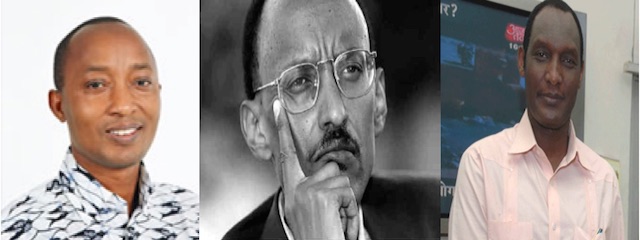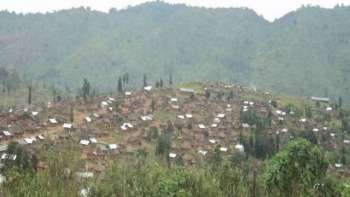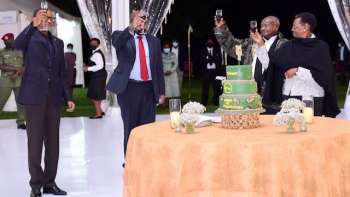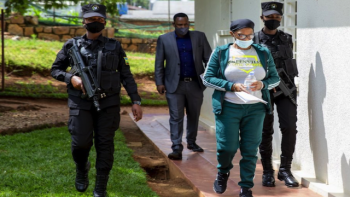"Through the disruptive influence of Lt. Gen. Kayumba Nyamwasa and his Tutsi military allies, and the acquiescence of Hutu elements in the Bureau of the Executive Committee, a proposal for the reformed statute of the organization was deemed unimportant and shelved, without giving a chance to the Executive Committee, the Political Bureau and RNC members to discuss it, " Dr Theogene Rudasingwa, the embattled leader of Rwandan National Congress (RNC), one of the main Rwandan opposition parties in exile, said in a statement on July 1st, 2016. According to the same statement Major Dr Rudasingwa , his brother Dr. Gerald Gahima, Joseph Ngarambe and Jonathan Musonera have decided to form a new party, "New-RNC".
Former Comrades, Now on Opposing Camps.
Dr Theogene Rudasingwa was distancing himself from the party he co-founded with Lt Gen Karumba Nyamwasa and the late Colonel Patric Karegeya, about five years ago. Lt Gen. Karumba Nyamwasa, Major Dr. Rudasingwa and Colonel Patrick Karegeya were, arguably, the closest aides to the current Rwandan dictator, General Paul Kagame, before fleeing the country. Once in exile, they accused Paul Kagame of being a dictator and an assassin.
In good days, Major Dr Rudasnigwa was once Rwandan Ambassador to the United States and the Secretary General of the ruling Rwandan Patriotic Front, Lt. Gen. Nyamwasa was the overall Chief of Staff of the Rwandan Defense Forces, whereas Col Patrick Karegeya was the Intelligence Chief. Over the last 5 years, Lt Gen Nyamwasa, who has been in exile in South Africa, escaped two assassination attempts by Rwandan Intelligence operatives, according to court ruling in South Africa. Col Karegeya was not luck: he was assassinated by Rwandan government operatives in a hotel in an affluent neighbor of Johannesburg, South Africa (see here).
Hence, the disagreement and break-up between Lt General Karumba and Maj Dr Rudasingwa, has sent waves of disappointment across the opposition. On the other side, according to sources close to Rwandan Government, an upbeat sentiment was palpable among the Rwandan ruling party elites, who seemed to predict the end of RNC as a viable opposition movement.
Reacting to Dr Rudasingwa's statement, his former deputy, Jerome Nayigiziki declared himself the new leader of RNC.
FDLR: Another Discord in the Opposition
The dissension within RNC, a civilian opposition party, created by former Rwandan Patriotic Front senior leaders follows another recent break-up within an armed opposition party, the Democratic Liberations Forces of Rwanda, FDLR. FDLR is composed mostly by former Rwandan Army (ex-FAR) soldiers and Hutu refugees. Their headquarter is in Eastern Democratic Republic of the Congo.
A month ago, FDLR vice-president, Col Wilson Irategeka, decided to break away from the FDLR and created his own political party, CNRD-Ubwiyunge. He accused the FDLR president, General Victor Byiringiro of divisive politics, incompetence, and other misdeeds. In turn, General Byiringiro, in a statement published on June 8, 2016, said that the FDLR leadership had in reality dismissed Col Wilson Irategeka for disregard of orders and protocols, divisive politics, being an agent of foreign forces, and making of false and defamatory statements against the leadership and other misdeeds.
A war of statements and counter-statements has ensued and is still on-going.
Dissensions: A Sign of Major Weaknesses in the Rwandan Opposition
These discords among two of the main political opposition parties in Rwanda could not came at wrong moment. The Rwandan dictator General Paul Kagame has decided to change the constitution of his country and seek a forbidden third term, beginning in 2017. The move was condemned by Rwandan opposition and African Western governments. The condemnation had fueled the momentum of Rwandan political parties as they sought to challenge Paul Kagame's decision in 2017.
In fact, as many observed, "Rwanda today has no civic freedom, no free press or political opposition. It is a small country dominated by one leader," (see our article: Rwanda: What Do you Do When People Dismantle Democracy? NPR Asks of June 2016).
The discords appear to reinforce the points. On the other side, other political observers of the Great Lakes Regions of Africa, in general, and Rwanda, in particular appear to see the upheavals as a good opportunity.
"Perhaps, with the conflicts and dissensions within two of the main Rwandan opposition parties in exile, we may see a consolidation of the various factions of the political organizations around a unified platform, with the aim of challenging the Rwandan dictator, " an RNC leader told AfroAmerica Network.
Maybe, maybe not. Currently, Rwandan opposition in exile is divided into two main camps: armed political opposition and civilian political opposition. The armed political opposition is composed of two major parties: FDLR and National Democratic Congress (NDC), with NDC being a coalition of Rally for Unity and Democracy (RUD-Urunana) and Rally of the Rwandan People (RPR - Inkeragurabara). RPR is mostly compose of former RPF members and leaders.
The main civilian opposition parties are: RNC, FDU - Inkingi, and PS-Imberakuri
Hence, it appears that the Rwandan opposition has reached the crossroads and is facing a critical choice: Will they or will they not succeed to form a unified political opposition capable of challenging Rwandan Paul Kagame?
Paul Kagame has been trying to use the Rwandan people to dismantle democracy. Now, it appears that the opposition is trying to use itself to dismantle itself.
















